5 start with M start with M
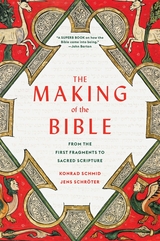
“The Making of the Bible is invaluable for anyone interested in Scripture and in the intertwined histories of Judaism and Christianity.”
—John Barton, author of A History of the Bible: The Book and Its Faiths
The authoritative new account of the Bible’s origins, illuminating the 1,600-year tradition that shaped the Christian and Jewish holy books as millions know them today.
The Bible as we know it today is best understood as a process, one that begins in the tenth century BCE. In this revelatory account, a world-renowned scholar of Hebrew scripture joins a foremost authority on the New Testament to write a new biography of the Book of Books, reconstructing Jewish and Christian scriptural histories, as well as the underappreciated contest between them, from which the Bible arose.
Recent scholarship has overturned popular assumptions about Israel’s past, suggesting, for instance, that the five books of the Torah were written not by Moses but during the reign of Josiah centuries later. The sources of the Gospels are also under scrutiny. Konrad Schmid and Jens Schröter reveal the long, transformative journeys of these and other texts en route to inclusion in the holy books. The New Testament, the authors show, did not develop in the wake of an Old Testament set in stone. Rather the two evolved in parallel, in conversation with each other, ensuring a continuing mutual influence of Jewish and Christian traditions. Indeed, Schmid and Schröter argue that Judaism might not have survived had it not been reshaped in competition with early Christianity.
A remarkable synthesis of the latest Old and New Testament scholarship, The Making of the Bible is the most comprehensive history yet told of the world’s best-known literature, revealing its buried lessons and secrets.
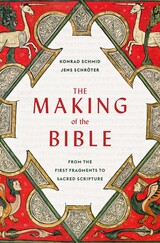
“A landmark…If you have time to read only one book on the Bible this year, make sure that it is this one.”—Katherine J. Dell, Church Times
“Excellent…With a sure touch, the authors lead the reader through the geopolitical context of the Hebrew Bible and the setting and background of the New Testament, finding something to say about practically every book’s origins and development.”—John Barton, The Tablet
“A remarkable deep dive into foundational books whose origins are often taken for granted.”—Publishers Weekly
In this revelatory account of the making of the foundational text of western civilization, a world-renowned scholar of the Hebrew scriptures joins a noted authority on the New Testament to reconstruct Jewish and Christian scriptural histories and reveal the underappreciated contest between them.
The New Testament, they show, did not develop in the wake of an Old Testament set in stone. The two evolved in parallel, often in conversation with each other, ensuring a continuing mutual influence of Jewish and Christian traditions. A remarkable synthesis of the latest Old and New Testament scholarship, The Making of the Bible is the most comprehensive history yet of the long, transformative journeys of these texts on route to inclusion in the holy books, revealing their buried lessons and secrets.
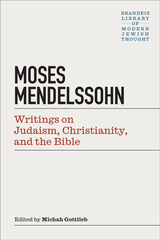
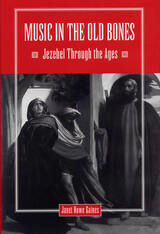
An alien, a polytheist from Phoenicia, the biblical Queen Jezebel posed a serious threat to the stability of the Israelites' single male deity. So powerful was this threat that writers through the ages have portrayed her as the incarnation of feminine evil, and her name has become synonymous with the misogynist view of women as seductresses.
Janet Howe Gaines argues that the bride of the Israelite king Ahab became a convenient scapegoat for biblical writers who portrayed her as the primary force behind their nation's apostasy. The biblical account presents the queen as a murderer, as a disruptive force for evil. Despised, the strong-willed Jezebel is still one of the most intriguing women of the Bible.
Music in the Old Bones is a guide to the eternal Jezebel story. The first part of this illustrated study is a detailed analysis that explores the biblical tale from traditional and feminist points of view. Gaines then analyzes the ways authors through the centuries have treated Jezebel. Her unburied bones became misogynist relics for generations of writers who retold her story as a warning about the dangers of rebelling against patriarchal society. From the sermons of John Knox to the novels of Margaret Atwood, from the poetry of Percy Shelley to the ballads of Boyz II Men, from the drama of Racine to the Academy Award-winning film starring Bette Davis, Jezebel has long been the subject of artistic inquiry. Her image as the bad girl of the Bible is still useful to writers. Most exploit her name and evil reputation to enhance their admonitions to women, but a few break away from tradition and openly admire Jezebel's courage and vigor.
Placing the biblical account of Jezebel's doomed reign in the context of its xenophobic writers, Gaines proposes a new and more sympathetic reading of the murdered queen whose body was left to rot in the streets and whose reputation suffered a fate even more egregious. Rather than providing a decent burial for the mangled bones of Jezebel, Gaines seeks to flesh them out and revivify them because, as she demonstrates, "there's music in the old bones yet."
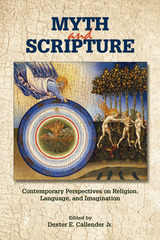
An interdisciplinary collection for scholars and students interested in the connections between myth and scripture
In this collection scholars suggest that using “myth” creates a framework within which to set biblical writings in both cultural and literary comparative contexts. Reading biblical accounts alongside the religious narratives of other ancient civilizations reveals what is commonplace and shared among them. The fruit of such work widens and enriches our understanding of the nature and character of biblical texts, and the results provide fresh evidence for how biblical writings became “scripture.”
Features:
- Essays that explore how myth sheds light on the emergence of scripture
- Examples drawn from the Ancient Near East, Hebrew Bible, New Testament, and Greco-Roman world
- Articles by experts from a range of disciplines
READERS
Browse our collection.
PUBLISHERS
See BiblioVault's publisher services.
STUDENT SERVICES
Files for college accessibility offices.
UChicago Accessibility Resources
home | accessibility | search | about | contact us
BiblioVault ® 2001 - 2024
The University of Chicago Press









